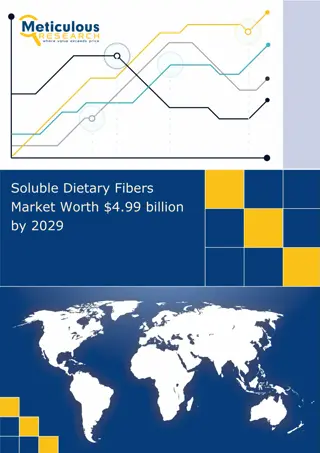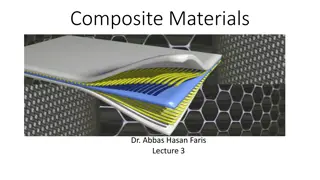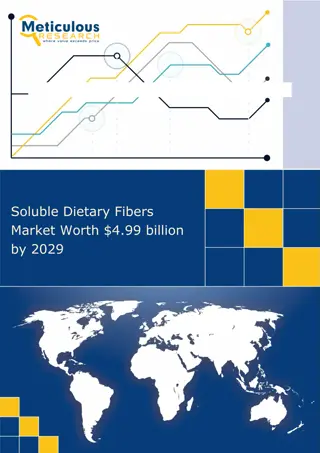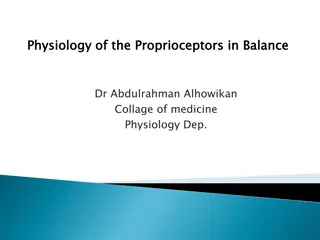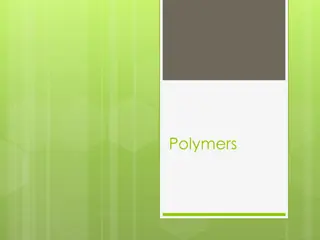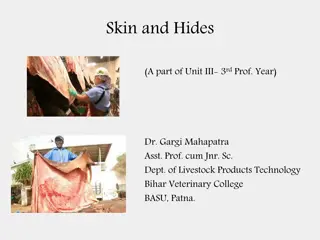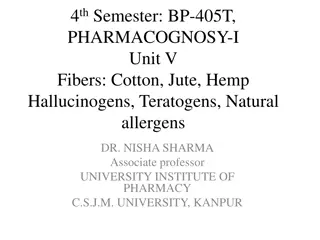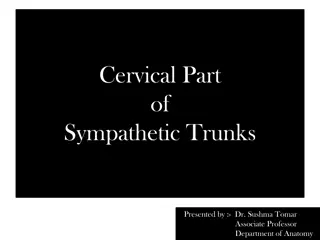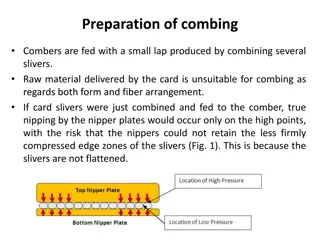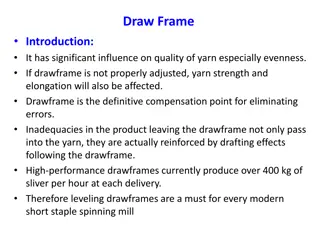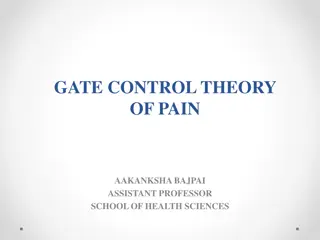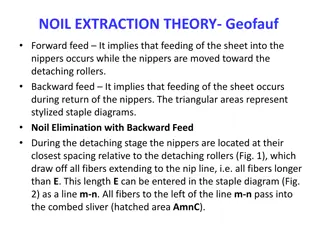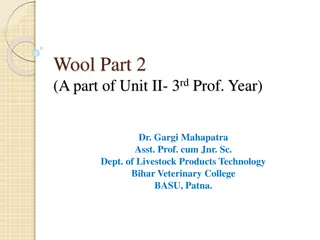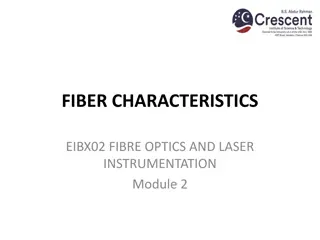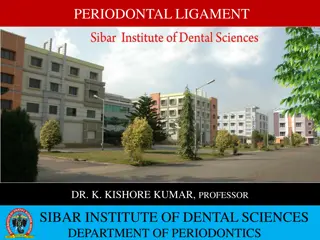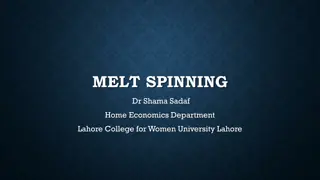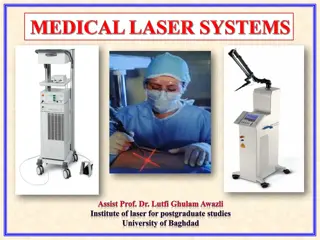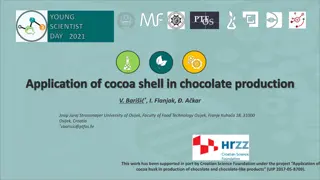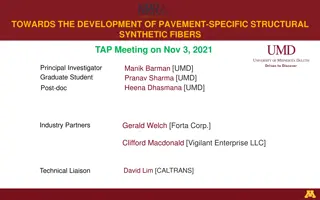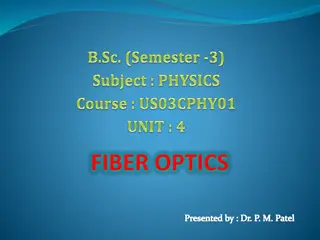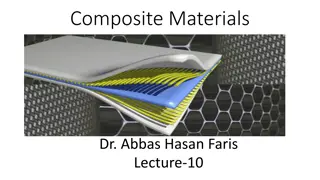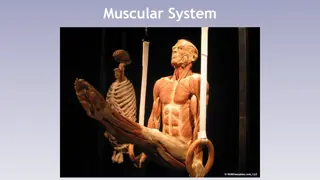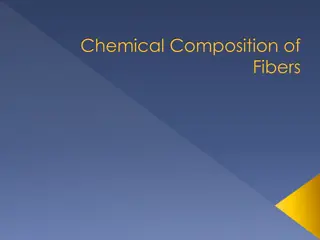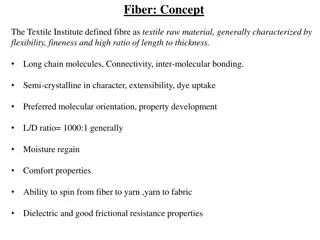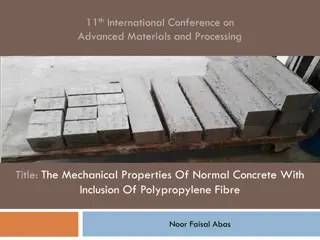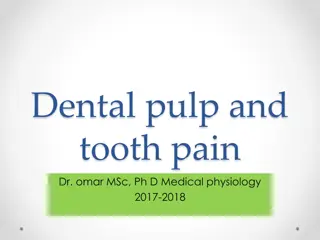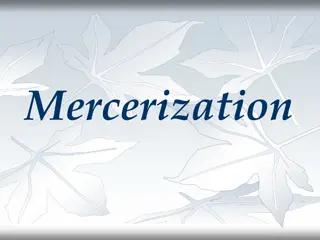SMALL FIBRE
Small fiber neuropathy involves thin and unmyelinated nerve fibers, leading to various sensory disturbances. The Erlanger and Gasser classification details the different types of nerve fibers involved. Symptoms include burning, tingling, and numbness, often presenting in a stocking-glove pattern. Di
4 views • 53 slides
Soluble Dietary Fibers Market Worth $4.99 billion by 2029
Nation-wide lockdowns in some regions have impacted the transportation of raw materials from suppliers. The temporary closures of manufacturing bases due to indefinite lockdowns and temporary quarantines impacted the growth of the soluble dietary fibers market during the pandemic.
0 views • 3 slides
Nerve and muscle physiology
The lecture delves into the intricate structure of nerves, highlighting the morphology of nerve fibers and the process of myelination. It explores the classification of nerve fibers, emphasizing the role of dendrites, axons, and synaptic functions in the nervous system. The significance of Schwann c
4 views • 29 slides
Understanding Composite Materials: Reinforcement and Matrix in Composites
Composite materials consist of reinforcement and matrix components, each serving a specific purpose to enhance the properties of the composite. The reinforcement phase provides strength and stiffness, while the matrix transfers loads and protects the fibers. Different types of reinforcements and mat
8 views • 18 slides
Understanding the Rule of Mixtures in Composite Materials
The Rule of Mixtures (ROM) is a weighted method for predicting the properties of composite materials, such as fiber-reinforced polymers (FRP). This method relies on assumptions regarding the homogeneity and properties of fibers and matrices. By combining volume fraction and properties linearly, the
5 views • 23 slides
Soluble Dietary Fibers Market Projected to Reach $4.99 Billion by 2029
According to this latest publication from Meticulous Research\u00ae, the global soluble dietary fibers market is expected to grow at a CAGR of 7.8% from 2022 to 2029 to reach $4.99 billion by 2029\n
1 views • 4 slides
Meticulous Research® Publishes Comprehensive Report on the Medical Laser Market Projecting $17.3 Billion by 2031
Medical Laser Market Size, Share, Forecast, & Trends Analysis by Type (Device Type (Solid-state Lasers, Gas Lasers, Dye Lasers, Diode Lasers), Fiber Type (Disposable Laser Fibers, Reusable Laser Fibers)), Application (Device, Fiber), and Geography -
1 views • 4 slides
Understanding Proprioceptors and Their Role in Body Balance
Proprioceptors play a crucial role in providing information about the position of body parts, muscle spindle response to stretch, and muscle tension regulation. Muscle spindles and Golgi tendon organs are key components in maintaining muscle tone and ensuring proper reflex actions. This article delv
1 views • 23 slides
Understanding Polymers and Their Properties
Polymers are long chains of repeating monomers, with both natural and synthetic varieties. Natural polymers include silk, cellulose, and DNA, while synthetic ones encompass plastics, fibers, and elastomers. The properties of polymers, such as molar mass and monomer structure, determine their functio
0 views • 15 slides
Understanding the Importance of Skin and Hides in Livestock Industry
Skin and hides are crucial by-products of large and small animals, with differences in thickness and weight. They are sourced from slaughtered and fallen animals, processed through drying, tanning, and conditioning to produce leather. Leather has outstanding strength, flexibility, and weather insula
0 views • 16 slides
Histological Structure of Liver and Spleen: Key Features and Functions
In this informative content, the histological structures of the liver and spleen are explored in detail. Key components such as hepatocytes, sinusoids, bile canaliculi, and the spaces of Disse in the liver, and the white pulp and red pulp in the spleen are highlighted. The classic liver lobule, cent
2 views • 10 slides
Exploring Fibers: Cotton, Jute, and Hemp - Pharmacognosy Insights
Discover the world of natural fibers such as cotton, jute, and hemp in pharmacognosy. Learn about their biological sources, chemical constituents, uses, and classification based on origin. Delve into the properties and applications of these fibers, alongside insights on hallucinogens and their effec
0 views • 16 slides
Understanding the Cervical Part of Sympathetic Trunks
The sympathetic trunks play a crucial role in the human body, with the cervical part located in front of the transverse processes of cervical vertebrae and the neck of the 1st rib. This part presents three ganglia - superior, middle, and inferior. Sometimes, the inferior cervical and first thoracic
0 views • 25 slides
Understanding Easy-Care and Durable Press Finishes for Textiles
Easy-care and durable press finishes play a vital role in enhancing the quality and longevity of textiles, particularly those made of cellulose fibers. These finishes reduce shrinkage, improve wrinkle recovery, and maintain fabric appearance. While beneficial, they may impact fiber flexibility and s
0 views • 25 slides
Understanding Material Preparation for Combing Process in Textile Manufacturing
Material preparation plays a crucial role in the combing process in textile manufacturing. It involves feeding combers with a small lap, ensuring fibers are evenly arranged and parallelized for efficient combing operation. Lack of parallelization can lead to fiber loss and poor quality output. Prope
2 views • 18 slides
Understanding the Importance of Draw Frames in Spinning Mills
Draw frames play a crucial role in ensuring the quality and evenness of yarn in spinning mills. Proper adjustment of draw frames is essential for maintaining yarn strength and elongation. Historical inventions and advancements in draw frames have significantly improved their performance. The process
1 views • 50 slides
Understanding the Gate Control Theory of Pain in Pain Management
This detailed content delves into the Gate Control Theory of Pain, explaining pain pathways involving nociceptors, A-delta fibers, and C fibers. It further explores central pain pathways like the spinothalamic tract, spinomesencephalic tract, and spinoreticular tract. The theory's mechanism of pain
3 views • 11 slides
Noil Extraction Theory: Geofauf Forward and Backward Feed Methods
Noil extraction theory involves Geofauf forward and backward feed methods for processing fibers in textile manufacturing. Forward feed involves feeding the sheet into the nippers while moving towards the detaching rollers, while backward feed feeds the sheet during the nippers' return. The process i
0 views • 6 slides
Development of Wool Follicles in Sheep: A Detailed Overview
Wool production in sheep involves the development of wool follicles starting from the basal layer of the epidermis. The process includes the formation of follicles during gestation, thickening of the basal layer into a plug, growth of accessory structures like glands, and the differentiation of cell
0 views • 17 slides
Understanding Fiber Characteristics in Fiber Optics and Laser Instrumentation
This module explores the mechanical characteristics such as strength, static fatigue, and dynamic fatigue of glass fibers in fiber optics. It discusses the cohesive bond strength of glass fibers, static fatigue under humid conditions, and dynamic fatigue during installation and operation. The transm
0 views • 34 slides
Understanding the Periodontal Ligament in Dental Sciences
The periodontal ligament (PDL) is a vital connective tissue that supports teeth by attaching them to the jaw bone. It consists of various tissues including cementum and alveolar bone, and is rich in vascular and cellular components. The development of PDL fibers plays a crucial role in tooth support
1 views • 39 slides
Understanding Melt Spinning in Polymer Fiber Manufacturing
Melt spinning is a specialized extrusion process used for manufacturing polymer fibers at industrial scales. It involves melting the fiber-forming substance, extruding it through a spinneret, solidifying the filament, and applying spin finish. The method allows for shaping fibers in various cross-se
0 views • 10 slides
Overview of Laser Delivery Systems for Surgical Procedures
Institute of Laser for Postgraduate Studies at the University of Baghdad, led by Assist. Prof. Dr. Lutfi Ghulam Awazli, focuses on laser delivery systems in surgical procedures. The systems discussed include optical fibers, articulated arms, hollow waveguides, and free beams. Optical fibers, compose
0 views • 10 slides
Cutting-Edge Fiber to Chip Packaging for Quantum Applications
Cutting-edge research on fiber to chip packaging for quantum applications, showcasing low-loss techniques and advanced photonics devices. The study covers topics such as packaging multiple fibers, fabrication processes, fiber array fusion splicing, and transmission curves for multiple fibers. This w
0 views • 4 slides
Application of Cocoa Shell in Chocolate Production: Young Scientist Day 2021
Application of cocoa shell in chocolate production was explored at the Young Scientist Day 2021. The cocoa shell, a by-product rich in fibers, proteins, and bioactive components, is used in various applications including animal feed, mulching, and biodiesel production. High Voltage Electrical Discha
0 views • 6 slides
Understanding the Nervous System and Sensory Neurons
The nervous system plays a crucial role in connecting the central nervous system (CNS) to limbs and organs through the peripheral nervous system (PNS). It consists of sensory neurons that transmit impulses from sensory receptors to the CNS, allowing us to perceive and respond to various stimuli. The
0 views • 23 slides
- "Development of Pavement-Specific Structural Synthetic Fibers - TAP Meeting Insights
- The TAP meeting on the development of pavement-specific structural synthetic fibers held on November 3, 2021, highlighted key benefits of fibers in pavements, such as increased load transfer efficiency and reduced cracking. Various industry partners and experts discussed the participation of fiber
0 views • 42 slides
Understanding the Nervous System: A Comprehensive Overview
The nervous system consists of the central nervous system (CNS) and peripheral nervous system (PNS), with neurons as its basic unit. Neurons function as sensory, associative, and motor types, carrying impulses within the body. Parts of a neuron include the cell body, dendrites, axon, and terminal en
2 views • 86 slides
Designing a Fun and Tech-Infused Charity Costume for Marathon Runners
Your task is to design a charity costume for marathon runners that promotes the cause effectively, looks engaging, and incorporates cooling technologies. Consider fabric type, ease of movement, and recyclable materials. Explore fabric options, from natural fibers like cotton and wool to synthetic fi
0 views • 18 slides
Evolution of Optical Fiber Technology
Optical fiber technology has a rich history starting from John Tyndall's demonstrations in 1870 to the development of flexible fiberscopes by Hopkins and Kapany. This technology revolutionized communication systems and medical diagnostics, enabling the transmission of information through thin glass
0 views • 85 slides
Understanding Filament Winding Process for Composite Materials
Filament winding is an automated open molding process used for manufacturing hollow products like tubular structures, pressure vessels, and pipes. This process involves winding resin-impregnated fibers over a rotating mandrel to create high-strength composite parts. Common raw materials include cont
0 views • 15 slides
Understanding the Muscular System and Its Anatomy
The muscular system is vital for movement, posture maintenance, and organ protection. It consists of skeletal muscles that contract to create movement, circular muscles called sphincters for controlling openings, and muscle fibers arranged in fascicles with collagen layers like epimysium and endomys
0 views • 59 slides
Understanding Vat Dyes: Properties, Dyeing Process, and Limitations
Vat dyes are known for providing excellent color and fastness properties to textile materials, especially natural and manmade fibers. The dyeing process involves steps like aqueous dispersion, vatting, absorption by fibers, re-oxidation, and soaping off to ensure colorfastness. However, there are ce
0 views • 25 slides
Revolutionizing Plastics: Making Cellulose-Based Plastic from Hemp in New Mexico
New Mexico State University could lead the way in establishing a plastics industry using cellulose plant fibers, such as hemp, to create eco-friendly and sustainable plastic products. Zeoform, a material made from cellulose fibers and water, offers a patented process to form industrial-strength plas
0 views • 14 slides
Overview of Fiber Chemical Composition and Types
Fibers consist of polymers made from simple molecules, with natural fibers like wool, silk, cotton, and linen having specific compositions including proteins, cellulose, and glucose. Man-made fibers like rayon and acetate are chemically altered cellulose, while synthetic fibers like nylon and polyes
0 views • 11 slides
Understanding Cellulosic Fibres in Textile Raw Materials
Fiber concept includes the flexibility and characteristics of fibers as textile raw materials, with a focus on cellulose, the most abundant polymer in nature. Cellulose fibers, such as cotton, exhibit unique structural properties and molecular formations that contribute to their properties in fabric
0 views • 25 slides
Mechanical Properties of Concrete with Polypropylene Fibre Inclusion
Concrete is a brittle material that is strong in compression but weak in tension. In this study, the focus is on enhancing the mechanical properties of normal concrete by including polypropylene fibers. The inclusion of fibers helps improve crack resistance and flexural strength, acting as crack arr
0 views • 17 slides
Understanding Dental Pulp and Tooth Pain: A Comprehensive Overview
Dental pulp, a soft connective tissue, plays a crucial role in tooth health. It consists of various cells and components like collagen, proteins, and growth factors. The innervation of dental pulp by sensory fibers influences pain perception, with different types of nerve fibers implicated in differ
0 views • 23 slides
Understanding Mercerization: Transforming Cotton Fibers
Mercerization is a chemical treatment method primarily used on cotton fibers to enhance their strength, luster, and absorbency. The process involves treating the fabric with a concentrated solution of Sodium Hydroxide, resulting in various improvements such as increased dye absorption, enhanced stab
0 views • 25 slides
Understanding the Role of Microtubules in Cell Remodeling
The cytoskeleton, a network of fibers made from proteins, plays a crucial role in maintaining cell structure and shape. Microtubules, which are hollow straight rods made from tubulin proteins, control the movement of membrane-bound organelles and cell components. During cell division, microtubules a
0 views • 8 slides

